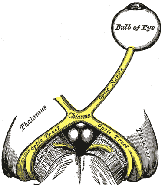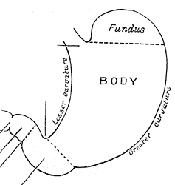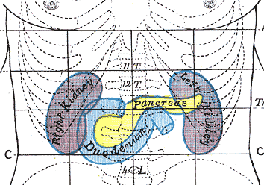
Home

Lab Tour

Lab Syllabus

Papers

Symposium
 Resources Resources
-
-
|
-

Lab 9: Renal Control of Body Fluids
[Reading] [Overview] [Useful Links] [Lab Report] [Further Study]
Pre-lab reading
- Lab manual - pages 91-97
- Vander, Sherman, and Luciano - Chapter 16.
Overview
Kidneys regulate the levels of ions and pH in our extracellular fluids and eliminate metabolic wastes and toxins, thus contributing to the homeostasis of our internal environment. In case you haven't thought recently about the importance of your kidneys, consider the following:
- Homeostasis of extracellular fluids is critical. For instance, red blood cells placed in distilled water literally explode due to the osmotic imbalance. Concentrations of water and solutes in the extracellular fluid must be maintained within a narrow range for healthy function.
- In people without functioning kidneys, metabolic wastes build up to toxic levels within several days, even with careful management of food and water intake.
- Kidneys process an enormous amount of fluid. During the 20 minutes you might spend reading this lab exercise, your kidneys will filter about 10 cups of bodily fluids, equal to half the volume of blood in your body. To avoid rapid dehydration, more than 99% of this filtered fluid must be reclaimed before the remainder is voided as urine.
- Kidneys are energetically expensive to operate. As you read this, about 20-25% of your cardiac output goes to supply your kidneys, even though they represent less than 1% of your body weight.
The goal of this laboratory exercise is to investigate how our kidneys respond to challenges to homeostasis in the form of a large ingested quantity of fluids and/or solutes. Although the response of the blood plasma is a good indicator of kidney function, plasma chemistry doesn't vary much in a healthy individual because regulation is so successful. We can learn more about how the kidney deals with threats to homeostasis by analyzing the volume and composition of urine it produces.
Your task, then, is to design an experiment in collaboration with your classmates to investigate some aspect of renal function. Possible topics include regulation of pH, sodium, osmolarity, and water balance. In the first week, you will work with your classmates to pick a question to investigate, generate hypotheses, and design an experiment to test those hypotheses. A variety of fluids and solutes are available for use in your experimental treatments. In the second week of lab, you will collect a baseline urine specimen, ingest whatever treatment dose you have chosen, and collect urine samples at 30-minute intervals during the remainder of the lab. On each sample, you will measure four parameters and calculate two additional ones. By pooling all data collected from your lab section you will be able to compare responses to the various treatments.
To see pictures of the equipment and how it is used, visit the
lab tour page.
Useful Links
Lab Report
No lab report due for this lab.
Further Study at Berkeley
Courses related to this lab topic
IB137. General Endocrinology. Course will address the role of hormones in physiology with a focus on humans. Regulation of hormone secretion and mechanisms of hormone action will be discusssed. Physiological processes to be addressed include reproduction, metabolism, water balance, growth, fetal development. Experimental and clinical aspects will be addressed. (Hayes)
Faculty doing research related to this lab:
Department of Integrative Biology
U. C. Berkeley
-
-
-
Last updated 1/13/06
- Copyright © Department of Integrative Biology. All rights reserved 2006
-
-
-
|
|